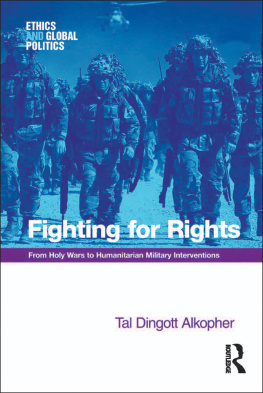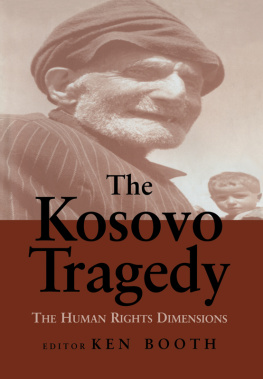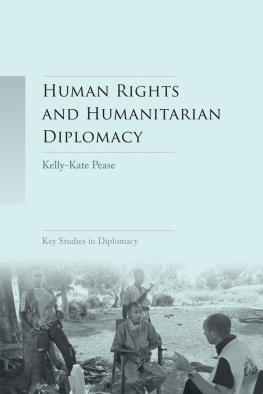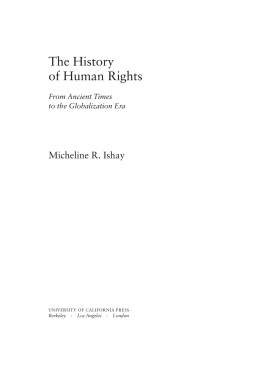FIGHTING FOR RIGHTS
Ethics and Global Politics
Series Editors: Tom Lansford and Patrick Hayden
Since the end of the Cold War, explorations of ethical considerations within global politics and on the development of foreign policy have assumed a growing importance in the fields of politics and international studies. New theories, policies, institutions, and actors are called for to address difficult normative questions arising from the conduct of international affairs in a rapidly changing world. This series provides an exciting new forum for creative research that engages both the theory and practice of contemporary world politics, in light of the challenges and dilemmas of the evolving international order.
Also in the series
Towards the Dignity of Difference?
Neither End of History nor Clash of Civilizations
Edited by Mojtaba Mahdavi and W. Andy Knight
ISBN 978 1 4094 3956 1
Ethical Foreign Policy?
US Humanitarian Interventions
Chih-Hann Chang
ISBN 978 1 4094 2548 9
Justice and Morality
Human Suffering, Natural Law and International Politics
Amanda Russell Beattie
ISBN 978 0 7546 7522 8
Targeting Terrorists
A License to Kill?
Avery Plaw
ISBN 978 0 7546 4526 9
Bloody Nations
Moral Dilemmas for Nations, States and International Relations
Cherry Bradshaw
ISBN 978 0 7546 7120 6
Fighting for Rights
From Holy Wars to Humanitarian Military Interventions
TAL DINGOTT ALKOPHER
Hebrew University of Jerusalem, Israel
First published 2013 by Ashgate Publishing
Published 2016 by Routledge
2 Park Square, Milton Park, Abingdon, Oxon OX14 4RN
711 Third Avenue, New York, NY 10017, USA
Routledge is an imprint of the Taylor & Francis Group, an informa business
Copyright Tal Dingott Alkopher 2013
Tal Dingott Alkopher has asserted her right under the Copyright, Designs and Patents Act, 1988, to be identified as the author of this work.
All rights reserved. No part of this book may be reprinted or reproduced or utilised in any form or by any electronic, mechanical, or other means, now known or hereafter invented, including photocopying and recording, or in any information storage or retrieval system, without permission in writing from the publishers.
Notice:
Product or corporate names may be trademarks or registered trademarks, and are used only for identification and explanation without intent to infringe.
British Library Cataloguing in Publication Data
Alkopher, Tal Dingott.
Fighting for rights : from holy wars to humanitarian military interventions. -- (Ethics and global politics)
1. War--Moral and ethic aspects. 2. Human rights. 3. War--Religious aspects. 4. Humanitarian intervention--History. 5. North Atlantic Treaty Organization--Armed Forces--Serbia--Kosovo.
I. Title II. Series
172.42dc23
Library of Congress Cataloging-in-Publication Data
Alkopher, Tal Dingott.
Fighting for rights : from holy wars to humanitarian military interventions / by Tal Dingott Alkopher.
p. cm. -- (Ethics and global politics)
Includes bibliographical references and index.
ISBN 978-1-4094-4539-5
1. War--Moral and ethical aspects. 2. Human rights. I. Title.
B105.W3A45 2013
172.42dc23
2012031226
ISBN 9781409445395 (hbk)
ISBN 9781315582320 (ebk-PDF)
ISBN 9781317135364 (ebk-ePUB)
Contents
Acknowledgments
The conception for this book grew out of my joint studies at the Hebrew University in Jerusalem with the Department of International Relations and the Department of French Language and Literature. During my studies under Professor Emanuel Adler I became fascinated by the activity of NATO within the changing and challenging security environment of the late twentieth century and the constructivist turn in international relations studies and research. I was also encouraged by Professor Sasson Sofer at the Department of International Relations of the Hebrew University to begin looking outside the sphere of contemporary international relations and to expand my historical thinking and research in international relations and politics to the period of medieval Europe. It was under his guidance that I began to explore the medieval views and discourses relating to just war. My studies in French language and literature also alerted me to the existence of a medieval mentalit and to its impact on medieval European social and political life. My readings of French historiographic ideas and the Annalists led me to develop the idea in this book, that during the Middle Ages the mentalit was a cognitive structure which constituted a set of particular interests, patterns of politics, and ultimately the wars of the crusades. My studies in this area have enabled me to present the present comparison between past and present and to weave them into a coherent research argument in the coming pages. But I could not have achieved this without the encouragement and support of my open-minded and inspiring professors who later became my colleagues and friends, such as Emanuel Adler, Sasson Sofer, and Raymond Cohen. I also want to express my special appreciation to Shlomo Avineri of the Hebrew University, who, as the former head of the European Forum at the Hebrew University of Jerusalem, not only encouraged me to publish a paper on NATOs intervention in Kosovo in 1999 through the Konrad Adenauer Foundation and enriched me with his sharp observations on the 1990s crisis in the Balkans and the role of NATO, but also enabled me to attend the Israeli-European Forum in Brussels 2001 and experience, albeit briefly, the discourse and activity of practitioners in some of the most important European institutions such as NATO and certain European Union organs.
I am also indebted to the colleagues and friends with whom I met and discussed my thesis many times in my postdoctoral period in the then Munk Centre for International Studies at the University of Toronto (now the Munk School of Global Affairs): David Welch, Janice Stein, Louis Pauly, Joshua Goldstein, and Frank Griffiths, and to the Munk Centres Postdoctoral Forum, 2004. It is also a great pleasure to thank Michael Gross, with whom I had (and still have) numerous insightful discussions on morality in wars in general and military humanitarian intervention in particular while teaching at the University of Haifa (200508). I will always cherish the unconditional support of my other colleagues from Haifa University, such as Benny Miller, Uri Bar-Joseph, Avi Ben-Zvi, Ranan Kuperman, and Zack Levi. I also want to express my gratitude to fellow students at the Department of International Relations who later become colleagues: Piki Ish-Shalom, who encouraged me in my contemplation of conceptions of rights, especially with regard to their correlative duties and responsibilities; Oded Lwenheim, with whom I discussed the constitutive impact of discourse and norms; and Amir Lupovici, who helped me during my struggle with constructivist methodology. I was also lucky to have had the support (emotional and intellectual) of other Hebrew University colleagues: Galia Bar Nathan, Arie Kacowicz, Yaacov Vertzberger, Gadi Heimann, and Nava Lwenheim.
Some of the ideas and findings in this book were previously published in International Studies Quarterly










